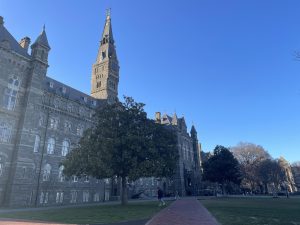The Georgetown University Student Association (GUSA) Senate passed six resolutions at its Feb. 25 meeting, including a resolution urging the university to join the Questbridge program, which supports first-generation and low-income (FGLI) students’ college applications.
The senate also unanimously passed resolutions to call for a longer winter break in future calendar years, allow for the optional display of mean grades for an entire graduating class on transcripts, revise GUSA bylaws to allow a simple majority to pass a budget, amend a budget guide and open a snack bar on the upstairs floor of Leo J. O’Donovan Dining Hall. After tabling a resolution calling for mental health days for students at its Feb. 11 meeting, the senate again tabled the same resolution this week over enforcement concerns with professors.
At the meeting, senators debated the merits of joining Questbridge, a nonprofit organization that helps FGLI students apply to and attend one of its 52 partner colleges through support programs and a college-student match program.
Senator Ethan Henshaw (CAS ’26) said he supported the resolution as a means of increasing representation of low-income students at Georgetown, as 13% of students at the university are eligible for Pell grants, federal financial aid grants, compared to 34% nationwide.
“The goal is to increase the amount of first-generation being admitted from low-income backgrounds,” Henshaw said at the meeting. “We are doing a very, very poor job recruiting, admitting or enrolling low-income students.”
“In terms of applying to colleges, the goal is that students can get in and barriers can be broken down to encourage students to apply,” he added.
In response to concerns over the Office of Undergraduate Admissions’ reluctance to join Questbridge, Henshaw said passing the resolution would help create a dialogue with the administration.

“I think it’s just good to go to the bargaining table and it shows that we have support for this in the student body,” Henshaw said. “We’ve got to keep trying and as I said, the numbers are abysmally low, especially in terms of economic diversity.”
Senator Keatyn Wede (CAS ’27) said the program provides vital resources for FGLI students, including her family members and friends, to navigate the college process.
“Both my parents grew up on a reservation in South Dakota, and so we have a lot of family and friends, a lot of cousins, who are very low-income Native Americans living on the reservation,” Wede said at the meeting. “Questbridge at those high schools offers a way to make the application process easier.”
“Showing our support for this just makes sense, because it helps make that application process navigable to people and high schools that don’t have college counselors,” Wede added.
The resolution ultimately passed 23-2, with only Senators Max Massick (CAS ’24) and George LeMieux (CAS ’25) voting against it.
Senators also debated on whether to allow exam days to be possible excused absences before revisiting the resolution that urges the university to recognize mental health days as excused absences.
Senator Jeffrey Mueller (CAS ’24) said students should be able to use the proposed mental health days on exam days, noting mental health should be taken as seriously as physical health.
“Mental health should be seen as equal to physical health,” Mueller said. “I’ve had professors where they said, ‘You can’t have make-up exams,’ and then I’ve gotten actually physically sick and explained to them and they’re not allowed to force you to come in, especially since COVID and things like that. So I think that that really wouldn’t be an issue as long as we’re all on the same page that mental health and physical health are equal.”
Senator Samuel Lovell (CAS ’25) sponsored the resolution to allow students to display the mean GPA of a student’s graduating class next to their GPA on transcripts to indicate their performance compared to the rest of the class, adding that the policy currently exists though has not been implemented in several years.
“It was passed by the Faculty center about 15 years ago or so. The policy hasn’t changed. The only thing that’s changed is the registrar isn’t upholding the policy and allowing it,” Lovell said. “So I want to emphasize that it’s completely optional. If a student doesn’t want to display mean grades, they don’t have to. It’s a policy that is in the books and the registrar just simply isn’t following.”
The senate passed the winter break resolution urging the university to institute longer winter breaks in the future, acknowledging that the calendars are set until the 2027-2028 school year.
Henshaw said the university should ensure winter breaks remain over 20 days in duration and support the petition that calls for a longer break next year, as this past winter break was 24 days long and next year’s will only be 17 days.
“I think that three weeks is enough time to get rest to recover for the next semester. And if 10% of the student body are international students who have to rush home, a shorter break poses challenges. The idea was that this is both the support of the petition and then also expanding the resolution to say that we also want to ensure that this is enshrined in future,” Henshaw said.








